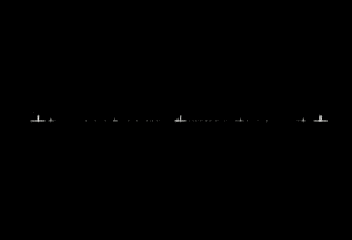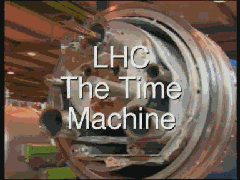The Large Hadron Collider (LHS): a“doorway” to the New World Order?
“The eyes of the world are on Geneva, where scientists are expected to throw the switch … on what may be the biggest experiment ever conducted. It’s certainly the most expensive. The European Organization for Nuclear Research, or CERN, has spent roughly $8 billion digging a 27-kilometer tunnel on the outskirts of the city and filling it with equipment that pushes the limits of technology …”
Reading this Newsweek report (Sep 6, 2008, announced for Sep 15, 2008 issue) and thinking…
The governments of 20 European countries, plus the U.S., invest $8 billion to reproduce conditions just after the Big Bang… But “Big Bang” is a theory, one of many hypotheses of how the universe came to be. The fact that it is the most popular and best supported theory doesn’t prove it in any way.
The problem with theories is that we’re never sure of the results of their experimental checking. In his very optimistic interview to the Telepgraph, Prof. Stephen Hawking, of the University of Cambridge, says: “Whatever the LHS finds or fails to find, the results will tell us a lot about the structure of the universe”. Thus, the scientists know that the experiment can fail. It happens in science. But does it happen in politics? In other words, should we all understand that governments of 21 countries paid $8 billion without being sure they didn’t throw such a huge sum away?
Before trying to answer these rather rhetorical questions, let’s take a look at the history of the project. The LHS in Geneva is not the first, but the second attempt. In the 1980s and early 1990s, 30 kilometers of tunnel was dug in Waxahachie, Texas, south of Dallas, to house the Superconducting Supercollider—a machine that was to be much like the LHC, but bigger and more expensive. President Ronald Reagan called the project a “doorway to a new world” and agreed to foot the $8.4 billion price tag. In 1993, with $2 billion spent and cost estimates swelling to $11 billion, the project came to an abrupt end: the Congress pulled the plug.
So, the Reagan administration considered the project extremely important. But why? Scientific curiosity?
The topic becomes more clear when we read the recent article in Scientific American, describing the less known side and purpose of the project, which “will usher in a new era not only of physics but also of computing“.
Before the end of 2008, the LHC is projected to begin pumping out a tsunami of raw data equivalent to one DVD (five gigabytes) every five seconds, with annual output of 15 petabytes (15 million gigabytes).
Not any longer. A stargate based is now the heart of Europe
It is said that the challenge is “making that data accessible to a scientist
anywhere in the world at the execution of a few commands on her laptop”. But what kind of data? And to whom exactly it will be accessible?
According to David Bader, executive director of high performance computing at the Georgia Institute of Technology, the LHS-based Computer Grid and an open-source middleware platform called Globus will allow “home computers to provide instant weather forecasts by accessing information from nearby environmental sensors. Or it might help sift through a life’s accumulation of personal medical records or years of home video footage looking for dimly remembered events”.
The most interesting here is that it’s going to be all but transparent to the end user. Scientific American tells us that “in a perfect world”, Globus or its successors would simply make everything on a given grid straightforwardly and transparently accessible from ANY computer. “If Globus is a success,” Bader said, “then you won’t hear about it.”
Life’s accumulation of personal medical records (and all other personal records, provided they are stored in the database anywhere in the world), years of home video footage, all this straightforwardly searchable and accessible from ANY computer… Imagine databases like the French Edvige or others, already existing or in preparation, powered by this LHS/Globus platform, reinforced by HAARP remote control capabilities, and you get … a perfect tool to manipulate every human being on this planet!
Now take a closer look at some interesting phrases in the quotations above. Ronald Reagan called the LHS project a “doorway to a NEW WORLD”. Did he forget to add “ORDER”? And which “perfect world” the author of the article in Scientific American is talking about? And isn’t it lovely: “If Globus [LHS] is a success, then you won’t hear about it”!
New York Times, United States -
By BRIAN GREENE THREE hundred feet below the outskirts of Geneva lies part of a 17-mile-long tubular track, circling its way across the French border and ...
LHC Scientist Confuses Star Wars with Star Trek, Universe Doomed Gizmodo - NEW HAVEN, CONNECTICUT. (Agencies) The scientific world is shocked today as Michael Zeller—a professor of physics at Yale who has been working at the Large ... |
 | Update2: Large Hadron Collider Went Online And The World Is Still Here eFluxMedia - By Alice Turner The Large Hadron Collider, built by European scientists, is expected to bring about the biggest advances in the field of particle physics ... |
 | Why the Large Hadron Collider must be stopped CNET News, CA - I am not an intelligent designer. Nor am I a resident of France or Switzerland. But this Large Hadron Collider experiment, in which particles are breaking ... |
Atom Smasher Reveals New Aspect of Memeverse Wired News - With the Sarah Palimania fading, the users of Twitter have found a new meme to get clever with: the Large Hadron Collider, the world's biggest, ... |
Experiment makes a star of the cosmos South Coast Today, MA - By BECKY W. EVANS Who says conversations about big-bang theory, black holes and other mysteries of the cosmos are reserved for quantum physics gurus like ... |
Particle Accelerator Speeds Into an Age of "New Physics" Washington Post, United States - By William Booth MEYRIN, Switzerland -- It is the biggest machine ever built. Everyone says it looks like a movie set for a corny James Bond villain. ... |
For Yale team, a search for dark matter Yale Daily News, CT - Yale scientists began work Wednesday on the Large Hadron Collider (LHC), the largest and most expensive international particle physics experiment to be ... |
 | The Big Bang, The Big Snoop, Big Mice, and The Big Con Fog City Journal, CA - By Thembi Mutch It’s been huge news here, the Big Bang experiment. So, whilst Americans bicker about ‘lipstick on a pig’ - (what a fabulous image, ... |
 | What Will the Collider Tell Us? Newsweek - By Daniel Stone | Newsweek Web Exclusive Buried under the French-Swiss border, the Large Hadron Collider has gotten its share of ink--and for good reason. ... |
Hey, Dad, did you hear the world was going to end this week? ZDNet - So says my oldest nonchalantly as he go in the car yesterday. He was, of course, referring to the Large Hadron Collider that just conducted its first ... |
There are currently two webcams online Camera 7: looking at the Underground Experimental Cavern from the Saleve side. Camera 8: looking out of the window of the 1st Floor of the SCX building that houses the CMS Control room.

Name that Particle Accelerator! Nicknames for the Large Hadron ... Scienceline, NY - By Adam T. Hadhazy, posted September 12th, 2008. Do you think “Large Hadron Collider” (LHC) is a clunky name for the world’s biggest atom smasher? ... |
Scientists hope for surprises in Big Bang experiment Reuters - By Robert Evans GENEVA (Reuters) - Scientists involved in a historic "Big Bang" experiment to begin this week hope it will turn up many surprises about the ... |
Largest Particle Collider Conducts First Successful Test Sofia News Agency, Bulgaria - Largest Particle Collider Conducts First Successful Test: With the Wednesday official startup of Europe's Large Hadron Collider, a new scientific wonder of ... |






















No comments:
Post a Comment